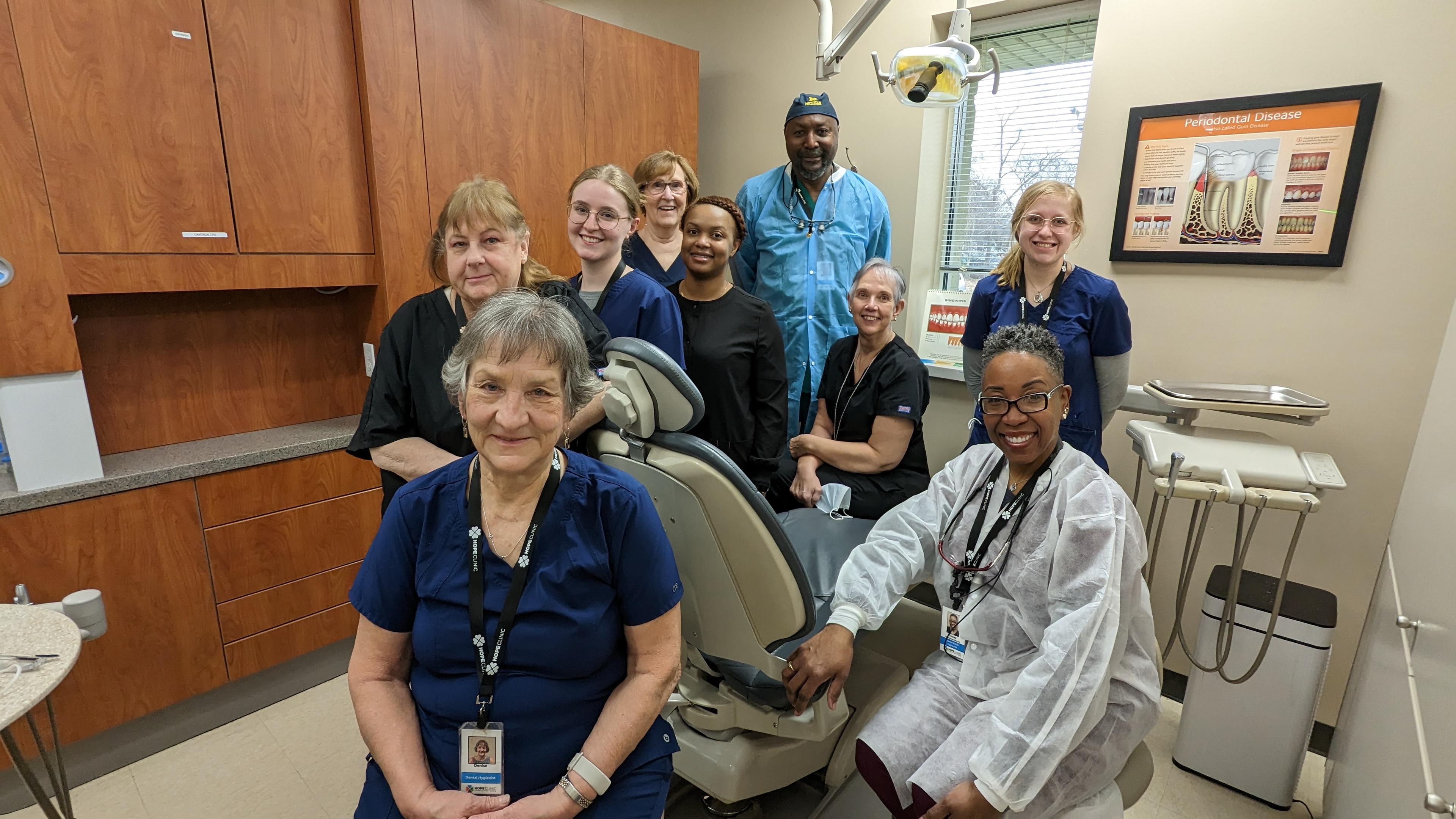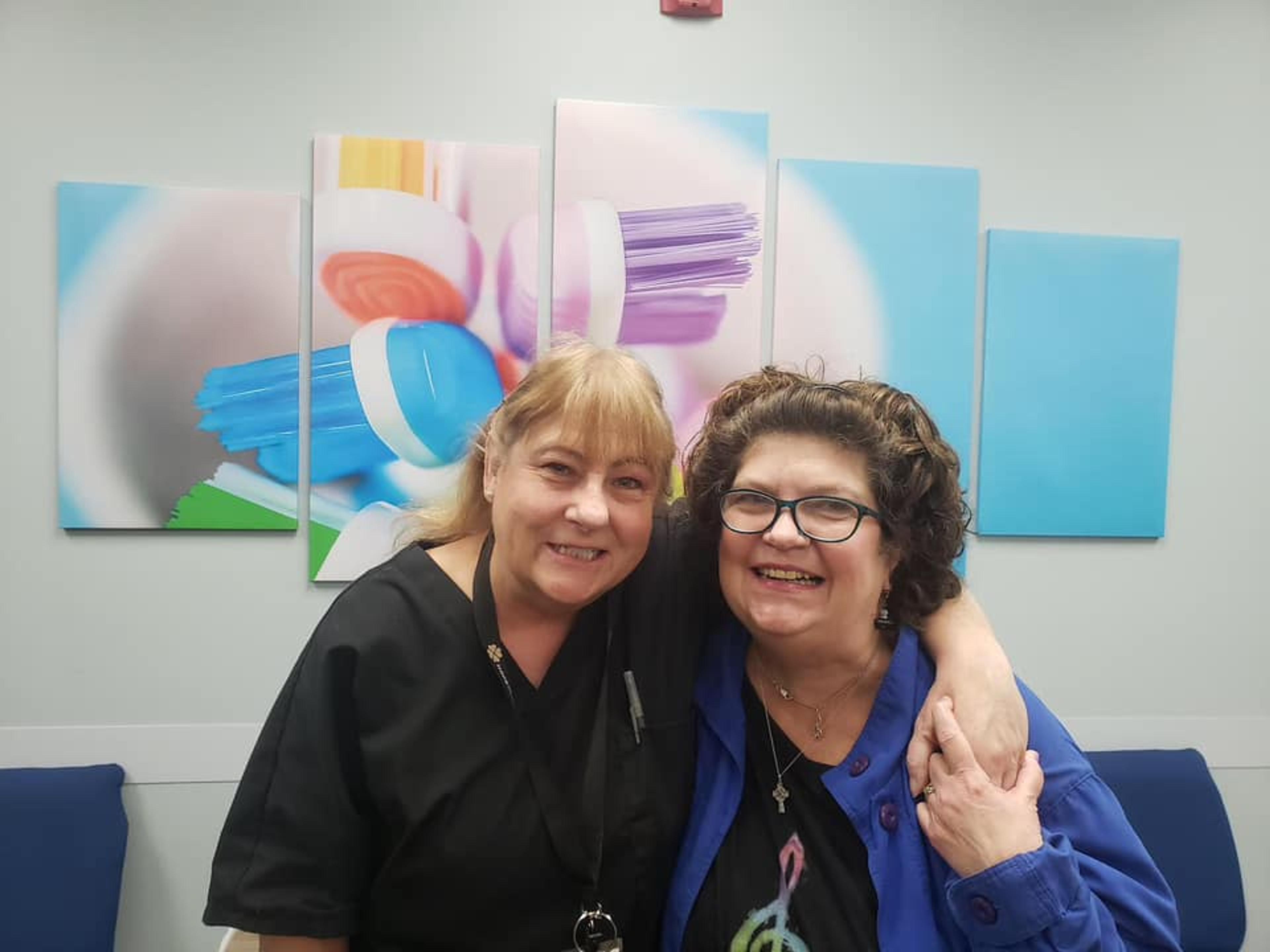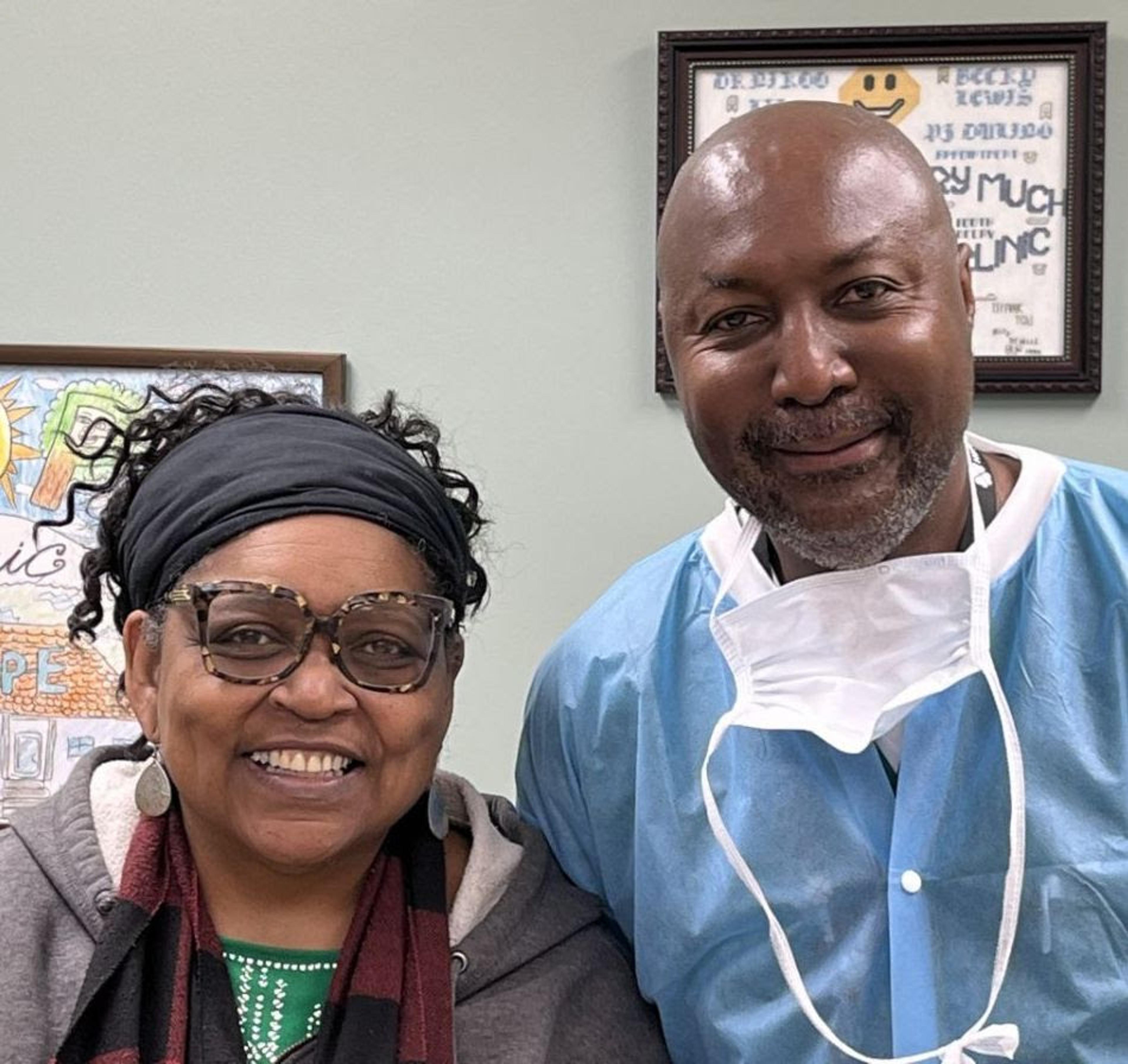Hope Clinic Offers Life-Changing Dental Care in Southeast Michigan
Amy Barczy
| 5 min read
Amy Barczy is a former brand journalist who authored content at Blue Cross Blue Shield of Michigan. Prior to her time at Blue Cross from 2019-2024, she was a statewide news reporter for MLive.com. She has a decade of storytelling experience in local news media markets including Lansing, Grand Rapids, Holland, Ann Arbor and Port Huron.

The first time Dr. Mark Cooks saw Jeanne Campbell, 58, of South Lyon, she would barely open her mouth.
Campbell’s front teeth were decaying and failing after a battle with an illness in 2019 that landed her in the hospital twice and made it difficult to keep up with regular oral care while she was on disability. As a lifelong singer, performer and music teacher, the condition of her smile was keeping her from doing what she loved. She fell into depression.
“It was very difficult,” Campbell said, explaining how she stopped teaching and stopped singing because of her appearance. “There was such a stigma with no teeth.”
Even for those with dental insurance, the quotes for the dental work would cost tens of thousands of dollars. Campbell found Dr. Cooks and Hope Clinic in Ypsilanti – who were able to offer her the dental services she needed to get physically – and mentally – healthy.
Hope Clinic fills a gap for their clients: offering compassionate dental care for individuals that otherwise have nowhere else to turn – a service that has had life-changing results.
A new lease on life
One-third of adults in Michigan don’t see a dentist every year. That percentage is higher – nearly 55% – for individuals without insurance and for individuals with disabilities (38%).
Hope Clinic serves low-income patients and uninsured patients in Washtenaw and Western Wayne County with a safety net of integrated high-quality care and assistance. In addition to dental care, they offer medical, behavioral health services and a robust food service program.

Most patients find Hope Clinic when they need emergency dental care – as they’ve delayed routine care visits due to lack of insurance or lack of funds.
Cooks said about half of their patients have periodontal disease, a serious infection of the gums around the teeth that can be destructive to the jawbone if left untreated. Oral health is closely linked to whole-person health. The mouth can be an entry point for many types of bacteria – which can lead to inflammation in the body that contributes to problems with other conditions.
“Something that could be completed or solved with a routine filling – if you wait a couple of years, it becomes very serious. It becomes a root canal or cracked tooth,” said Cooks, who is the dental director at Hope Clinic. “Due to the financial burden that dental comes with, in most instances, when someone comes to us, a lot of times they’re in pretty bad shape. It gets very costly very quickly, especially when you come with a lot of needs.”
That was the case for Campbell. After rounds and rounds of appointments – five teeth were removed; her front teeth were drilled down and capped – and she received a front bridge – Campbell has a new lease on life. Her last appointment with Hope was this March.
“I am very gregarious and outgoing – this really slowed me down,” Campbell said. “I have become myself again.”

Restoring smiles – and souls
Accessing oral health care is a significant issue for many individuals. In Michigan and across the U.S., there are significant inequities in the availability and quality of oral health care between people who are white and Black, Indigenous and other people of color. When compared to white adults, Black adults are 68% more likely to have unmet dental needs and Latinx adults are 52% more likely to report often having difficulty doing their job due to poor oral health.
In the dental program at Hope Clinic, the majority of their client population consists of individuals representing minority groups: 33% is Hispanic/Latino, 12% is Black/African American, 6% is Asian and almost 2% is Middle Eastern, and 38% percent of their client population is white.
Cooks recalls a Spanish-speaking patient who never spoke to him during appointments and always had her hand in front of her mouth. She would bring her son with her to communicate with the dental staff.
Her smile needed work: 10 teeth were removed; her gum health was restored and she received a new upper bridge and partial lower bridge. After more than 10 visits, the patient was handed a mirror to examine her new smile.
“She started talking and crying for the first time. I was shocked that she was saying something,” Cooks said. “She started talking in English – and it was just shocking all around. The teeth looked so good.”
A community effort
Services at Hope Clinic are made possible through community supports and partnerships.
The dental clinic operates four days a week and can see six patients a day on average, though it can serve up to 12. In addition to full-time staff, dentists and oral surgeons in the community also donate their time and perform critical oral surgery procedures to help patients at the clinic. Dental hygiene students from the University of Michigan also assist in performing dental cleanings and periodontal treatments, gaining valuable experience.
Blue Cross Blue Shield of Michigan has supported Hope Clinic in its work since 2005. Most recently, Hope Clinic was awarded a grant in 2023 to expand access to free dental care by hiring a second dental hygienist. With Blue Cross’ support, Hope Clinic provided free dental care for 845 patients, including 383 new patients. Hope Clinic increased the number of patients treated by 35% from the prior year, recorded over 2,500 patient encounters that included multiple procedures, and eliminated the waiting list.
“Oral health is a critical part of whole-person health. Hope Clinic is helping vulnerable individuals take care of their dental needs using a community approach – making a difference in the long-term health and well-being of their patients,” said Ken Hayward, vice president and special assistant to the president for Community Relations at Blue Cross.
For patients, the compassionate approach of the staff at Hope that makes a difference. Campbell said she looked forward to seeing Dr. Cooks and the clinic staff every time she went in for a dental appointment. Cooks said that’s a result of an intentional effort to treat every client with dignity and respect.
“It’s the way we treat them,” Cooks said. “They’re telling us: ‘Don’t let me scare you when you look in my mouth.’ We say, ‘That’s why you’re here. we want you here. The problems that you have are the problems that we handle.’ It really puts them at ease.”
Photo credits: Courtesy of Hope Clinic





